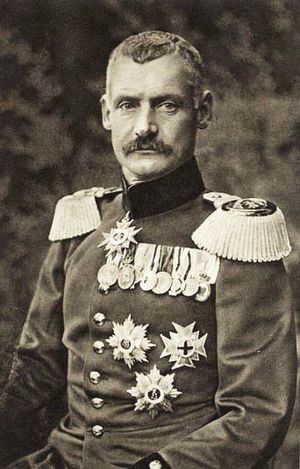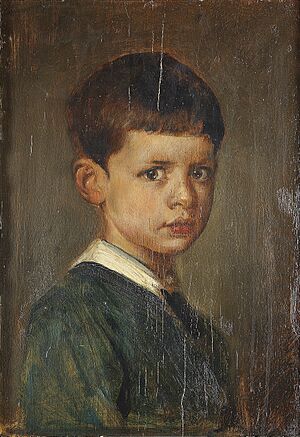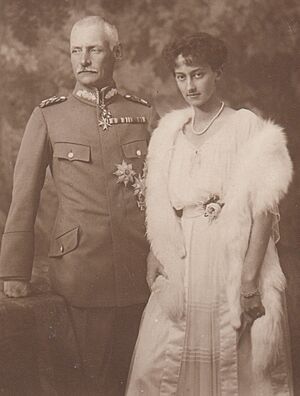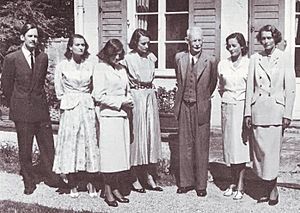Rupprecht, Crown Prince of Bavaria facts for kids
Quick facts for kids Rupprecht |
|
|---|---|
| Crown Prince of Bavaria | |

Rupprecht in uniform prior to World War I
|
|
| Head of the House of Wittelsbach | |
| Tenure | 18 October 1921 – 2 August 1955 |
| Predecessor | Ludwig III |
| Successor | Albrecht |
| Born | 18 May 1869 Munich, Kingdom of Bavaria |
| Died | 2 August 1955 (aged 86) Schloß Leutstetten, Starnberg, Free State of Bavaria, West Germany |
| Burial | Theatine Church, Munich |
| Spouse |
Duchess Marie Gabrielle in Bavaria
(m. 1900; died 1912)Princess Antonia of Luxembourg
(m. 1921; died 1954) |
| Issue |
|
| House | Wittelsbach |
| Father | Ludwig III of Bavaria |
| Mother | Archduchess Maria Theresia of Austria-Este |
Rupprecht, born on May 18, 1869, was the last person in line to become king of Bavaria. His full name was Rupprecht Maria Luitpold Ferdinand. He was also known as Robert in English. He lived until August 2, 1955.
During the first part of World War I, he led the German Sixth Army. This army fought on the Western Front. Later, he commanded a larger group of armies called Army Group Rupprecht of Bavaria. This group faced the British forces.
Contents
Early Life and Education
Rupprecht was born in Munich. He was the oldest of thirteen children. His father was Ludwig III, the last King of Bavaria. His mother was Archduchess Maria Theresa of Austria-Este.
From age seven, he had a special teacher. He spent a lot of time at his family's homes. These included Schloss Leutstetten and a villa near Lindau. He loved sports and being active.
His education was traditional, but he also went to a public school. This was unusual for a royal at the time. He studied at the Maximilian-Gymnasium in Munich for four years. Besides his schoolwork, he learned to ride horses and dance. He also had to learn a trade, and he chose carpentry.
Before World War I
Rupprecht's grandfather, Luitpold, became the ruler of Bavaria. This happened because King Ludwig II and his successor Otto were declared unable to rule. Because of this, it became clear that Rupprecht might become king one day.
After high school, Rupprecht joined the Bavarian Army. He started as a Second Lieutenant. He took a break from the army to study at universities. He traveled a lot to places like the Middle East, India, Japan, and China. He often traveled with his first wife.
When he was 31, Rupprecht married Duchess Marie Gabrielle in Bavaria. They had five children together. Sadly, she died young in 1912.
In 1912, his grandfather Luitpold passed away. Rupprecht's father, Ludwig, became the new Prince Regent. In 1913, Ludwig became King Ludwig III. This made Rupprecht the official Crown Prince of Bavaria.
Rupprecht and another Crown Prince, Wilhelm of Prussia, each led an army. They were part of the German war plan called the Schlieffen Plan.
Rupprecht in World War I
When World War I started in July 1914, Rupprecht took command of the German Sixth Army. This was on August 2, 1914. His army fought in the Battle of Lorraine. Even though he was a royal, he was a very skilled commander.
His army faced a French attack in August 1914. They then launched their own counterattack. Rupprecht's army did not break through the French lines. He was actually told to just keep the French busy. But he wanted to attack more strongly. He stayed on the Western Front for the rest of the war. A few days after the battle, his oldest son, Luitpold, died from polio.
In 1916, Rupprecht became a field marshal. This is a very high military rank. On August 28, 1916, he took command of a larger group of armies. This group was called Army Group Rupprecht of Bavaria.
Many people thought Rupprecht was one of the best royal commanders in the German army during World War I. He realized early on that Germany could not win the war. This was because the Allies had much more equipment. He also did not like the "scorched-earth" policy. This policy meant destroying everything when troops retreated. He wanted to resign because of this, but his royal position made it impossible. He finally left his command on November 11, 1918, when the war ended.
He got engaged to Princess Antonia of Luxembourg in 1918. But the war ending delayed their wedding.
Rupprecht and Airplanes
Max Immelmann, a famous German pilot from World War I, wrote about Rupprecht. In a letter from June 1915, he mentioned Rupprecht visiting an airfield. Rupprecht came to see the new Fokker Eindecker airplanes.
Immelmann wrote: "The Crown Prince of Bavaria visited the field and inspected us... to see these fighting machines."
After the War
After the war, on November 12, 1918, Rupprecht's father, Ludwig III, made a statement. He released his officials and soldiers from their promises to him. This was seen as his father giving up the throne. Bavaria became a republic, ending over 700 years of Wittelsbach family rule. Rupprecht lost his chance to be king.
Rupprecht went to Tyrol because he was worried about the new communist government in Bavaria. He came back in September 1919. While he was away, his mother died. He then became the Jacobite heir to the thrones of England, Scotland, and Ireland. This meant he could be called King Robert I of England. But he never claimed these titles.
The new political situation allowed him to marry Princess Antonia of Luxembourg. They married on April 7, 1921. A church leader who later became Pope Pius XII led the ceremony.
Rupprecht was against the Weimar Republic, which was Germany's government after the war. He never gave up his right to the throne. He believed Bavaria should be a constitutional monarchy. This means a king or queen would rule with a parliament.
After his father died in 1921, Rupprecht became the head of the House of Wittelsbach. He made an agreement with Bavaria in 1923. This agreement meant important Wittelsbach palaces, like Neuschwanstein, would belong to the Bavarian people.
Rupprecht was very critical of wars like World War I. He told the New York Times that future peace meetings could make wars more humane. He hoped they would even get rid of chemical weapons.
Rupprecht never joined the Nazis. Hitler tried to get him to join, even promising to bring back the monarchy. But Rupprecht did not trust them. He even helped stop Hitler's attempt to take power in 1923. Hitler privately disliked Rupprecht. Rupprecht told King George V in 1934 that he thought Hitler was crazy.
In 1932, during the Great Depression, there was a plan to give Rupprecht special powers in Bavaria. Many political parties supported this idea. But when Hitler became the leader of Germany in 1933, the plan ended. Rupprecht still hoped the monarchy would be brought back.
World War II and Exile
Rupprecht had to leave Germany in December 1939. The Nazis took over his home, Schloß Leutstetten. He went to Italy and stayed with King Victor Emmanuel. He and his family were not allowed to return to Germany.
He still hoped for a Bavarian monarchy. He thought Bavaria and Austria could form an independent South Germany. In 1943, he wrote that Germany would lose the war completely. He hoped to protect the German people when the Nazi government fell. He even thought about becoming the German emperor.
In October 1944, his wife and children were captured by the Germans. Rupprecht was still in Italy and avoided arrest. His family was sent to the Sachsenhausen concentration camp. In April 1945, they were moved to the Dachau concentration camp. They were freed by the United States Army.
His wife, Antonia, never fully recovered from being held captive. She died in 1954 in Switzerland. She had promised never to return to Germany after her terrible experience.
After World War II
After the war, Rupprecht returned to Bavaria. He still wanted the monarchy to be restored. But the US forces occupying Germany did not support this. However, they treated him with respect. General Dwight D. Eisenhower even gave him a special plane to fly back to Munich in September 1945. He returned to Schloss Leutstetten.
In 1954, 70 out of 170 members of the Bavarian parliament said they supported a monarchy. This showed that many people still liked the idea of a king.
Death and Legacy
Rupprecht died in 1955 at Schloss Leutstetten. He was 86 years old. He received a state funeral, like a king. His life saw many changes in Germany. He lived through the Kingdom of Bavaria, the German Empire, Nazi Germany, and the start of West Germany.
He is buried in the crypt of the Theatinerkirche in Munich. He is buried near his first wife and his oldest son.
Family Life
Rupprecht married twice and had children with both wives.
His first wife was Duchess Marie Gabriele in Bavaria. They married on July 10, 1900. They had five children:
- Luitpold Maximilian Ludwig Karl (1901–1914); died of polio.
- Princess Irmingard Maria Therese José Cäcilia Adelheid Michaela Antonia Adelgunde (1902–1903); died of diphtheria.
- Albrecht, Duke of Bavaria (1905–1996).
- A daughter who was stillborn in 1906.
- Prince Rudolf Friedrich Rupprecht (1909–1912); died of diabetes.
His second wife was Princess Antonia of Luxembourg. They married on April 7, 1921. They had six children:
- Prince Heinrich Franz Wilhelm (1922–1958). He died in a car accident.
- Princess Irmingard Marie Josefa (1923–2010).
- Princess Editha Marie Gabriele Anna (1924–2013).
- Princess Hilda Hildegard Marie Gabriele (1926–2002).
- Princess Gabriele Adelgunde Marie Theresia Antonia (1927–2019).
- Princess Sophie Marie Therese (born 1935).
Titles and Honours
Rupprecht had many titles. His full title was "His Royal Highness Rupprecht Maria Luitpold Ferdinand, Crown Prince of Bavaria, Duke of Bavaria, of Franconia and in Swabia, Count Palatine by the Rhine."
He also received many honours and awards from different countries. These included:
- Knight of St. Hubert (Bavaria)
- Grand Cross of the Military Order of Max Joseph (Bavaria)
- Knight of the Black Eagle (Prussia)
- Iron Cross (1914), 1st and 2nd Classes (Prussia)
- Pour le Mérite (military), with Oak Leaves (Prussia)
- Knight of the Golden Fleece (Austria)
- Grand Cordon of the Order of Leopold (Belgium)
- Grand Cordon of the Order of the Chrysanthemum (Japan)
- Honorary Grand Cross of the Royal Victorian Order (United Kingdom)
|
See also
 In Spanish: Ruperto de Baviera para niños
In Spanish: Ruperto de Baviera para niños





